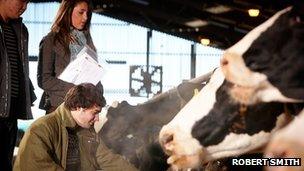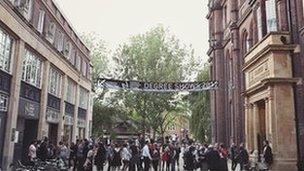'New' universities set to be created in England
- Published

Royal Agricultural College will become Royal Agricultural University
About a dozen "new" universities are set to be created in England in both the private and state sectors.
It is the first time in 20 years that a new wave of universities has been created.
Ten are long-established specialist institutions which are set to be awarded full university status.
They include the Royal Agricultural College and University College Falmouth, which will be Cornwall's first fully-fledged university.
Two, possibly three, private colleges are also expected to be made universities, though not all will be for-profit.
The Universities and Science Minister David Willetts has announced the names of the state institutions in line to be made universities.
His department has recommended the changes to the Privy Council, which is likely to approve them.
The government says the change - and increasing private provision - are part of a drive to promote diversity in the university sector which will improve standards and student choice.
But critics say the expansion of profit-seeking companies will damage it.
Confusing titles
The conversions to university status follow a recent change in how universities are legally defined.
Previously, to be called a university, an institution needed to have 4,000 full-time students, and meet other criteria, but now that student number has been dropped to 1,000.
This has opened the gateway for many specialist institutions to gain the university status they had wanted for some time.
Mr Willetts said: "These well-known and highly-regarded university colleges represent over 1,200 years of history between them.
"It is right to remove the barriers preventing high-quality higher education providers like these calling themselves universities simply because of their size.

Norwich University College of the Arts opened in 1845
"I am delighted that they have taken up the opportunity offered by our reforms. This will lead to the biggest creation of universities since 1992 and will enable more people to realise their aspiration of going to a university."
The 10 specialist centres are all currently classified as University Colleges, a distinction lost on most of the public but important to the institutions, which say the variety of terms confuses would-be applicants.
Guild HE is the body which represents the 10 and other institutions specialising in areas such as the arts, education, agriculture and sport.
Its chief executive Andy Westwood said the granting of the university title would be "hugely welcome" and the "right thing to do".
"It's recognition that these are institutions that have for a long time been doing what the country and students need - developing high quality education," he told BBC News.
"New universities they might be - but new institutions - very far from it.
"Gaining university title is long overdue and it helps to provide greater choice for students and for businesses, while enhancing the quality and diversity of the UK's higher education sector as a whole," he added.
The institutions see the change as the removal of what they say is an anomaly and that having "college" in their titles confuses people, especially internationally.
The Royal Agricultural College, in Cirencester, which was set up in 1845, is one of the 10.
It runs about 30 degree and post-graduate courses in agriculture, business, equine, food, land and property management and is planning to change its name to Royal Agricultural University.
Principal Prof Chris Gaskell said: "'University' best describes what the institution does and aspires to do; university title will benefit our students, their employers and the industries to which they contribute - and agriculture, food and land management are some of the most important industries in the world today."
University College Falmouth opened in 1902 as an arts school and has about 4,000 students doing mainly degrees and post-graduate studies in art, design, media, performance and writing.
Private institutions
Newman University College in Birmingham will now be Newman University and the vice chancellor Professor Peter Lutzeier said that the quality of the institution had already been established, but the change in title would clarify its status, particularly for overseas students.
"The university college title did create confusion outside the sector. The clarification provided by obtaining full university status is particularly important in light of the recent marketisation of higher education and will prove invaluable as we look to strengthen our international links."
Professor John Last, chief executive of Norwich University College of the Arts, said: "This is a very significant announcement which recognises that 'university' title has to be about quality and not merely size and corrects an anomaly for a specialist institution established in 1845".
For most people, the upgrading of university colleges to full university status will not be controversial, but more might oppose the granting of university status to private institutions - especially if they seek to make a profit.
Last week the College of Law announced it had been granted the title. It is changing its name to the University of Law and is set to be England's first fully-fledged university to be allowed to make a profit.
It was previously a charity but was taken over by a venture capital firm earlier this year.
Another private institution which is expected to be given the university title soon is Regent's College in London, which does not take a profit, but instead ploughs funds back in to the institution.
It is thought at least one other conversion of a profit-making institution is imminent.
Opposition to such moves centres on the idea that public money - in the form of tuition fees backed by student loans - is going in to private hands or the pockets of share holders.
Representing academics, University College Union (UCU) general secretary Sally Hunt said of the changes involving "for profit" institutions: "UCU has real concerns about how the interests of students and the academic excellence for which the UK is renowned will be protected when experience in other sectors and from America shows that profits and education do not mix."
Nicola Dandridge, chief executive of Universities UK, said: "These 10 institutions have a longstanding tradition of delivering higher education and today's recommendation for university title is recognition of the quality and diversity they offer to students.
"Each institution has demonstrated a long and successful track record of working closely with the sector regulators of data, quality and funding as well as demonstrating strong governance."
Announcements about the private institutions becoming universities are being made by the institutions concerned. Their applications to change their status go via a different route, not through the Privy Council.
Announcements - and confirmation of the Privy Council's decisions - are expected in the next few weeks.
- Published27 July 2012
- Published4 July 2012
- Published14 August 2012
- Published16 September 2010
- Published6 September 2011
- Published30 January 2012
- Published13 April 2011